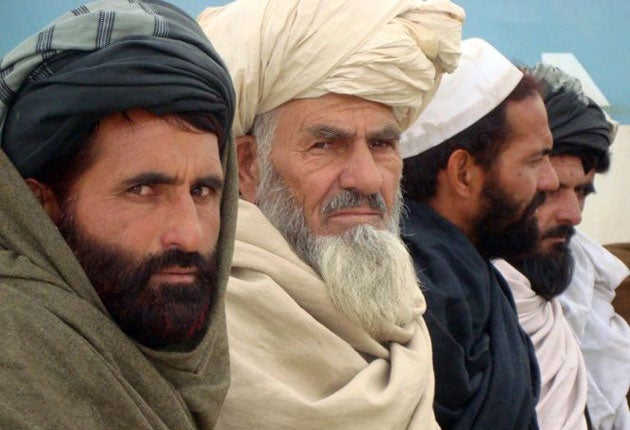Tribal leaders to sabotage West's assault on Taliban
Plan to enlist local militias threatens to backfire

They came in the night and shot Saeed Alam in his bed. His three-year-old son was crying at his feet and his mother had leapt on top of him to try to block the bullets. Both of them were hurled out of the way and an American soldier opened fire.
America's plans to enlist Afghan militias in the war against the Taliban are running into difficulties while still in their infancy. In eastern Paktia province, the white-bearded Afghan village elders who are crucial to the "Afghan awakening", are threatening to unite against the Americans unless such night raids by US special forces are halted.
Saeed Alam was shot four times in the chest in the raid last Saturday. His son landed in a fire pit, used for cooking. His mother died of shock the next day. The American soldiers left, taking 10 other Afghans with them. "We are not Taliban. We do not support al-Qa'ida but if these searches continue we will definitely join the anti-government elements," said Mr Janan, a senior member of the Gardeserai shura, or council.
A delegation of elders travelled to the provincial capital, Gardez, on Tuesday to protest about the raids. "We have 9,000 people in our tribe and we will take up arms against them," Mr Janan warned.
An American press release claimed the raid helped "decimate" a terrorist network. It described Saeed Alam as a militant and said he was holding a grenade while using his mother and son as a human shield. "The force engaged the militant with small-arms fire, killing him while protecting the women and children," the statement said. "Coalition forces estimate they safeguarded 16 women and 31 children."
The elders swore Alam was innocent. At least five of those arrested during the raid have since been released, without charge. Contrary to the American statement, the elders said there were no Afghan troops involved, and they said they knew the soldiers were special forces because they had beards.
"Raiding people's houses and snatching people away creates a very negative impression in the communities," said a senior Western policy analyst, working in the region.
"The special forces have got an important role to play but, at the moment, with the way they are structured and the way they are being used, it's hard to say they bring any net benefit."
Haji Ghazi, the head of the shura, said troops kicked down doors and smashed windows in simultaneous raids against five houses in a village called Suri Khel. "Saeed Alam's mother was trying to save her child, and she was beaten," said Raheem Gul, describing the way the soldiers hauled her out of the firing line.
The soldiers arrived in trucks at 11.30pm and left at about 3.30am. The night after, six more men were whisked away by troops in helicopters.
"What laws allow them to kill him without an investigation?" Mr Janan said. "There are no courts, there is no justice. We are Muslims. Maybe they are from another religion but there are international laws and customs. Who will tell me that killing this person was legal?"
Gardeserai's most famous export is one of America's most wanted terrorists, Jalaluddin Haqqani – a former mujahedin commander, turned Taliban grandee. Once a darling of the US-funded jihad against Soviet troops in Afghanistan, he was left out of the 2001 Bonn conference to rebuild Afghanistan and now controls fighters across the south-east.
There is little doubt that some of the elders have ties to his fighters. One of the shura members is his cousin. They are all part of the Zadran tribe, which covers nine districts split evenly across Paktia, Paktika and Khost. "We are under pressure from two sides," Mr Janan said. "On one side there is the Taliban with swords. On the other side it's the Americans with night raids, searches, inhumane treatment, killing, shooting and arresting. They want our support but they have done nothing for us."
Very little development has reached the Zadran territories in the aftermath of the US-led invasion in 2001. By contrast, Mr Haqqani is remembered as a hero of the jihad, who used Cold War cash, channelled through Pakistan, to build schools and madrasas.
Gardeserai, where Saeed Alam was killed, was supposed to benefit from the Zadran Arc Stabilisation Initiative, which saw modest amounts of development money given to tribal shuras, or village councils. "The whole deal was on the one hand there's development and on the other hand there's security, but the security bit hasn't really stuck," said a Western diplomat involved.
Fighting raged in Zadran districts last summer but development workers were spared any violence which elders say is evidence of their influence.
Join our commenting forum
Join thought-provoking conversations, follow other Independent readers and see their replies
Comments
Bookmark popover
Removed from bookmarks